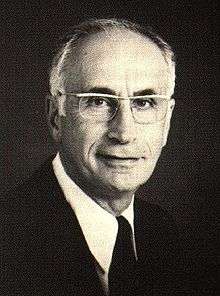Armen Alchian
| Armen Alchian | |
|---|---|
 | |
| Born |
April 12, 1914 Fresno, California |
| Died |
February 19, 2013 (aged 98) Los Angeles, California |
| School or tradition | New institutional economics |
| Alma mater | Stanford University (B.A., PhD) |
| Influenced | Steven N. S. Cheung, William F. Sharpe, Harold Demsetz, Walter E. Williams, Thomas Sowell |
| Information at IDEAS / RePEc | |
Armen Albert Alchian (April 12, 1914 – February 19, 2013) was an American economist and an emeritus professor of economics at the University of California, Los Angeles.
Biography
Alchian was born in Fresno, California into a family with Armenian background. He attended California State University, Fresno for two years before transferring to Stanford University in 1934, where he earned both a B.A. (1936) and a Ph.D. (1944). He served as a statistician with the USA Army Air Corps, from 1942 to 1946. In 1946, he joined the Economics Department at UCLA, where he spent the rest of his career. For many years, he was affiliated with the Rand Corporation. Alchian was elected a Fellow of the American Academy of Arts and Sciences in 1978.[1] In 1996, he became a Distinguished Fellow of the American Economic Association and in 2010 he received an honorary doctorate degree from Universidad Francisco Marroquín.[2] He is told to have been a member of Mont Pelerin Society.
Alchian is the founder of the "UCLA tradition" in economics, a member of the Chicago school of economics, and one of the more prominent price theorists of the second half of the 20th century. He is the author of pathbreaking articles on information and uncertainty, and the theory of the firm. Through his writings on property rights and transaction costs, he is a founder of the new institutional economics. Alchian's writings have touched on topics conventionally viewed as macroeconomic: money, inflation, unemployment, and the theory of business investment. His writings are characterized by lucid witty exposition and a minimum of mathematical formalism.
Alchian is the coauthor with William R. Allen of the influential introductory economics text Exchange and Production. Its content and organization differ radically from those of other American university economics texts written during the second half of the 20th century. This was the first American introductory text to discuss information, transaction costs, property rights, and a market economy as a discovery process. It also contains the classic statement of what has come to be known as the Alchian–Allen theorem. This proposition, colloquially known as "ship the good apples out," states that when output varies in quality, the lower quality output is consumed nearby while the higher quality output is shipped long distances. The reason is simple: transportation costs vary with the weight and bulk, but not the quality, of that which is transported. The added per-unit amount decreases the relative price of the higher-grade product.
Selected works
- Alchian, Armen (1950), "Uncertainty, Evolution and Economic Theory," Journal of Political Economy 58: 211–21.
- Alchian, Armen (1959), "Costs and outputs", in Abramovitz, Moses; et al., The allocation of economic resources: essays in honor of Bernard Francis Haley, Stanford, California: Stanford University Press, OCLC 490147128. ISBN 9780804705684.
- Alchian, Armen (1965), "Some Economics of Property Rights." II Politico 30: 816–829.[3]
- Alchian, Armen (1969), "Information Costs, Pricing and Resource Unemployment," Economic Inquiry 7: 109–28.
- Alchian, Armen; Demsetz, Harold (1972), "Production, Information costs and Economic Organization," American Economic Review 62: 777–795."
- Alchian, Armen; Crawford, Robert; Klein, Benjamin (1978), "Vertical Integration, Appropriable Rents, and the Competitive Contracting Process," Journal of Law and Economics 21: .
- Alchian, Armen (1978), Economic Forces at Work. Indianapolis: Liberty Fund. A number of Alchian's better known articles are reprinted here.
- Alchian, Armen (1983), Exchange and Production. Wadsworth Publishing. A revision of part of University Economics, first published in 1964.
- Alchian, Armen (1993), "Property Rights" in The Concise Encyclopedia of Economics", Liberty Fund.
Alchian's generalization
"Alchian's generalization" states that when an equal amount of payment is added to two competitive goods, the price of the dearer one will fall relative to the cheaper one. Therefore, there will be a tendency for consumers to substitute the dearer one for the cheaper one.[4]
See also
References
- ↑ "Book of Members, 1780–2010: Chapter A" (PDF). American Academy of Arts and Sciences. Archived (PDF) from the original on 10 May 2011. Retrieved 14 April 2011.
- ↑ Honorary Doctoral Degrees at Universidad Francisco Marroquín Archived 1 May 2011 at the Wayback Machine.
- ↑ "Armen A. Alchian". Concise Encyclopedia of Economics. Liberty Fund, Inc. December 2007. Retrieved October 11, 2012.
- ↑ 2004, "A-Level Microeconomics". Golden Crown Publications. By Chan Chi Man and Kwok Wai Keung
External links
- Armen A. Alchian (1914–2013). The Concise Encyclopedia of Economics. Library of Economics and Liberty (2nd ed.). Liberty Fund. 2013.
- Alchian's profile at UCLA.
- Article on Alchian from the UCLA student newspaper, the Daily Bruin.
- video collection from NewMedia Universidad Francisco Marroquín
Audio link
- "The Intellectual Portrait Series: A Conversation with Armen A. Alchian (2000)" at The Online Library of Liberty